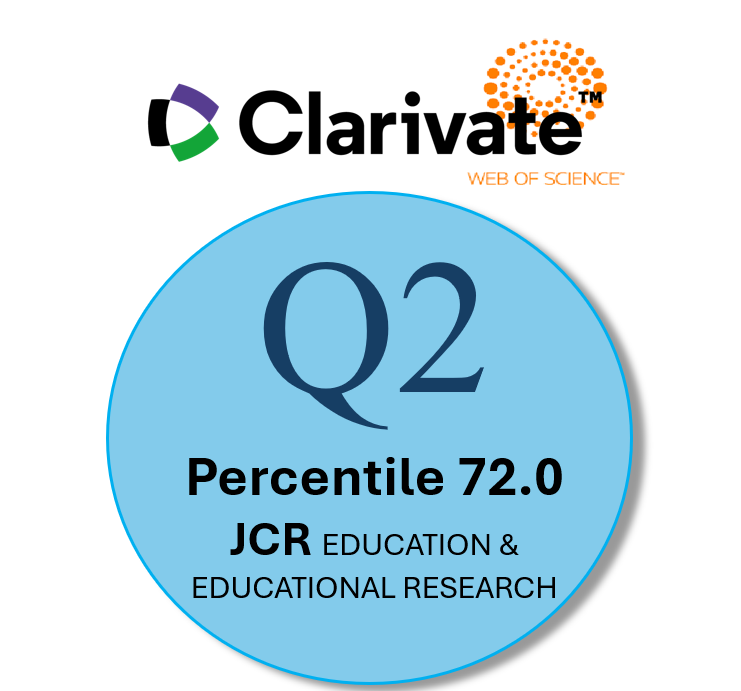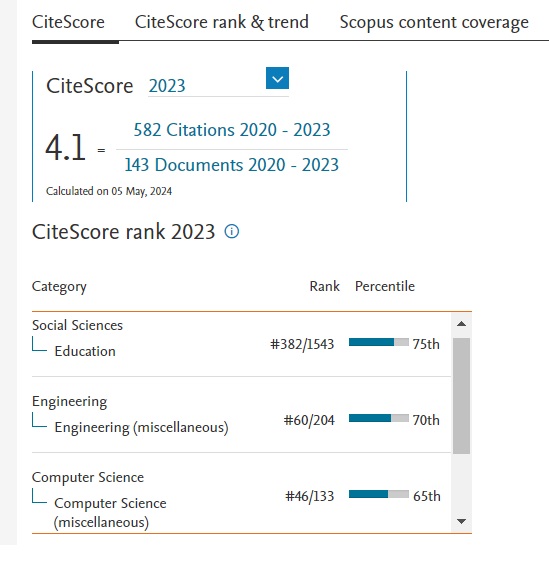Efectos de la retroalimentación del profesor
Un estudio de caso de un foro de discusión en línea en Educación Superior
Agencias de apoyo
- The authors of this work are members of the Development, Interaction and Communication in Educational Contexts Consolidated Research Grup. This group has been supported and financed by the Generalitat de Catalunya since 1995 (2017 SGR 1459).
Resumen
A pesar de su importancia, los efectos de la retroalimentación en entornos en línea no han sido ampliamente evaluados; tampoco hay consenso sobre cómo deben medirse. El objetivo de este estudio exploratorio es analizar los efectos de la retroalimentación del profesorado durante el desarrollo de un foro de discusión en línea. Durante un período de tres semanas, los participantes (14 estudiantes universitarios y su tutor) participaron en un debate virtual sobre el uso de Wikipedia con fines académicos, utilizando la plataforma Knowledge Forum (los participantes realizaron 328 publicaciones en total). Sobre la base de las características de los entornos de aprendizaje en línea, desarrollamos un modelo multidimensional para estudiar los comentarios del profesor y sus efectos durante la interacción en línea. Los resultados muestran los principales efectos de la retroalimentación tanto en la discusión de los estudiantes sobre los temas de aprendizaje -efecto en cadena y efecto en racimo-, como en las reglas de participación en el debate. El documento concluye con una discusión sobre las implicaciones teóricas y prácticas de estos resultados.
Descargas
-
Resumen2214
-
PDF 1524
Citas
Álvarez, I., Espasa, A., & Guasch, T. (2012).The value of feedback in improving collaborative writing assignments in an online learning environment. Studies in Higher Education, 37(3). https://doi.org/10.1080/03075079.2010.510182
Ajjawi, R., & Boud, D. (2018). Examining the nature and effects of feedback dialogue, Assessment & Evaluation in Higher Education, 43(7), 1106-1119. https://doi.org/10.1080/02602938.2018.1434128
Attali, Y., & Van der Kleij, F. (2017). Effects of feedback elaboration and feedback timing during computer-based practice in mathematics problem. Computers & Education, 110, 154-169. https://doi.org/10.1016/j.compedu.2017.03.012
Barberà, E. (2016). Aportaciones de la tecnología a la e-Evaluación. RED. Revista de Educación a Distancia, 50(4). http://www.um.es/ead/red/50
Boud, D., & Molloy, E. (2013). Rethinking models of feedback for learning: The challenge of design. Assessment & Evaluation in Higher Education, 38(6), 698–712. https://doi.org/10.1080/02602938.2012.691462
Carless, D. (2013). Trust and its role in facilitating dialogic feedback. In D. Boud & E. Molloy (Eds.), Feedback in higher and professional education (pp. 90-103). Routledge.
Cheng, K. H., Liang, J. C., & Tsai, C. C. (2015). Examining the role of feedback messages in undergraduate students' writing performance during an online peer assessment activity. The internet and higher education, 25, 78-84. https://doi.org/10.1016/j.iheduc.2015.02.001
Coll, C., Engel, A., & Bustos, A. (2009). Distributed teaching presence and participants’ activity profiles: a theoretical approach to the structural analysis of asynchronous learning networks. European Journal of Education, 44(4), 521–538. https://doi.org/10.1111/j.1465-3435.2009.01406.x
Coll, C., & Engel, A. (2014). Making meaning through joint activity in Computer-Suported Collaborative Learning (CSCL) settings: The interplay between content-related and activity-related talk. Anales de Psicología, 30(3), 818-831. https://doi.org/10.6018/analesps.30.3.201181
Coll, C., & Engel, A. (2018). El modelo de Influencia Educativa Distribuida Una herramienta conceptual y metodológica para el análisis de los procesos de aprendizaje colaborativo en entornos digitales. RED. Revista de Educación a Distancia, 58. https://revistas.um.es/red/article/view/350971
Coll, C., Rochera, M.J., De Gispert, I., & Díaz-Barriga, F. (2013). Distribution of feedback among teacher and students in online collaborative learning in small groups. Digital Education Review, 23, 27-46. https://doi.org/10.1344/der.2013.23.27-45
Coll, C., Rochera, M.J., & De Gispert, I. (2014). Supporting online collaborative learning in small groups: Teacher feedback on learning content, academic task and social participation. Computers & Education, 75, 53-64. https://doi.org/10.1016/j.compedu.2014.01.015
De Laat, M.F., Lally, V., Lipponen, L., & Simons, P.R.J. (2007). Online teaching in networked learning communities: a multimethod approach to study the role of the teacher. Instructional Science, 35(3), 257-286. https://doi.org/10.1007/s11251-006-9007-0
Espasa, A., Guasch, T., Mayordomo, R.M., Martinez-Melo, M., & Carless, D. (2018). A Dialogic Feedback Index measuring key aspects of feedback processes in online learning environments. Higher Education Research & Development, 37(3), 499-513. https://doi.org/10.1080/07294360.2018.1430125
Evans, C. (2013). Making Sense of Assessment Feedback in Higher Education. Review of Educational Research, 83(1), 70-120. https://doi.org/10.3102/0034654312474350
Filius, R., Kleijn, R., Uijl, S. Prins, F., van Rijen, H., & Grobbee, D. (2018). Strengthening dialogic peer feedback aiming for Deep learning in SPOCs. Computers & Education, 125, 86-100. https://doi.org/10.1016/j.compedu.2018.06.004
Galikyan, I., & Admiraal, W, (2019). Students' engagement in asynchronous online discussion: The relationship between cognitive presence, learner prominence, and academic performance. The Internet and Higher Education, 43, 100692. https://doi.org/10.1016/j.iheduc.2019.100692
Garrison, R., Anderson, T., & Archer, W. (2000). Critical inquiry in a text-based environment: computer conferencing in higher education. The Internet and Higher Education, 11(2), 1-14. https://doi.org/10.1016/S1096-7516(00)00016-6
Getzlaf, B., Perry, B., Toffner, G., Lamarche, K., & Edwards, M. (2009). Effective instructor feed- back: Perceptions of online graduate students. The Journal of Educators Online, 6(2). https://www.thejeo.com/archive/2009_6_2/getzlaf_perry_toffner_lamarche_edwards
Gielen, M., & De Weber, (2015). Structuring peer assessment: Comparing the impact of the degree of structure on peer feedback content. Computers in Human Behavior, 52, 315–325. https://doi.org/10.1016/j.chb.2015.06.019
Gikandi, J. W., & Morrow, D. (2016). Designed and implementing peer formative feedback within online learning environments. Technology, Pedagogy and Education, 25(2), 153-170. https://doi.org/10.1080/1475939X.2015.1058853
Gikandi, J. W., Morrow, D., & Davis, N.E. (2011). Online formative assessment in higher education: a review of the literature. Computers & Education, 57, 2333-2351. https://doi.org/10.1016/j.compedu.2011.06.004
Gros, B., & Silva, J. (2006). El problema del análisis de las discusiones asincrónicas en el aprendizaje colaborativo mediado. RED. Revista de Educación a Distancia, 16. https://revistas.um.es/red/article/view/24251
Guasch, T., Espasa, A. Álvarez, I., & Kirschner, P. A. (2013). Effects of feedback on collaborative writing in an online learning environment. Distance education, 34(3), 324-338. https://doi.org/10.1080/01587919.2013.835772
Häkkinen, P., & Järvelä, S. (2006). Sharing and constructing perspectives in web based conferencing. Computers & Education, 47, 433–447. DOI: 10.1016/j.compedu.2004.10.015
Hara, N., Bonk C. J., & Angeli, CH. (2000). Content analysis of online discussion in an applied educational psychology course. Instructional Science, 28, 115-152. https://doi.org/10.1016/j.compedu.2004.10.015
Hattie, J. & Gan, M. (2011). Instruction based on feedback. In R.E. Mayer y P. Alexander (Eds.), Handbook of research on learning and instruction (pp. 249-271). Routledge.
Hattie, J., & Timperley, H. (2007). The power of Feedback. Review of Educational Research, 77(1), 81-112. https://doi.org/10.3102/003465430298487
Hatziapostolou, T., & Paraskakis, I. (2010). Enhancing the Impact of Formative Feedback on Student Learning through an Online Feedback System. Electronic Journal of e-Learning, 8(2). https://files.eric.ed.gov/fulltext/EJ895699.pdf
Leibold, N., & Schwarz, L.M. (2015). The Art of Giving Online Feedback. Journal of Effective Teaching, 15(1), 34-46. https://uncw.edu/jet/articles/vol15_1/leibold.html
Ludwig-Hardman, S., & Dunclap, J. C. (2003). Learner support services for online students: scaffolding for success. International Review of Research in Open & Distance Learning, 4(1), 1–15. https://doi.org/10.19173/irrodl.v4i1.131
Martin, F., Wang, C., & Sadaf, A. (2018). Student perception of helpfulness of facilitation strategies that enhance instructor presence, connectedness, engagement and learning in online courses. The Internet and Higher Education, 37, 52-65. https://doi.org/10.1016/j.iheduc.2018.01.003
Nicol, D. (2010). From monologue to dialogue: Improving written feedback processes in mass higher education. Assessment & Evaluation in Higher Education, 35, 501–517. https://doi.org/10.1080/02602931003786559
Price, M., Handley, K., & Millar, J. (2011). Feedback: Focusing Attention on Engagement. Studies in Higher Education, 36(8).
https://doi.org/10.1080/03075079.2010.483513
Ramprasad, A. (1983). On the definition of feedback. Behavioral Science, 28, 4–13. https://doi.org/10.1002/bs.3830280103
Salter, N. P., & Conneely, M.R. (2015). Structured and unstructured discussion forums as tools for student engagement. Computers in Human Behavior, 46, 18–25. https://doi.org/10.1016/j.chb.2014.12.037
Scardamalia, M. & Bereiter, C. (2006). Knowledge building: Theory, pedagogy, and technology. In K. Sawyer (Ed.), Cambridge Handbook of the Learning Sciences (pp. 97-118). Cambridge University Press.
Schrire, S. (2006). Knowledge building in asynchronous discussion groups: going beyond quantitative analysis. Computers & Education, 46, 49-70. https://doi.org/10.1016/j.compedu.2005.04.006
Shute, V. J. (2008). Focus on formative feedback. Review of Educational Research, 78(1), 153-189. https://doi.org/10.3102/0034654307313795
Stein, D., Wanstreet, C., Slagle, P., Trinko, L., & Lutz, M. (2013). From ‘hello’ to higher-order thinking: The effect of coaching and feedback on online chats. The Internet and Higher Education, 16, 78-84.
https://doi.org/10.1016/j.iheduc.2012.03.001
Winstone, N., Nash, R., Parker, M., & Rowntree, J. (2017). Supporting Learners agentic engagement with feedback: A systematic review and taxonomy of recipience processes. Educational psychologist, 52(1), 17-37. https://doi.org/10.1080/00461520.2016.1207538
Yang, S-H. (2016). Conceptualizing effective feedback practice through an online community of inquiry. Computers & Education, 94, 162-177. https://doi.org/10.1016/j.compedu.2015.10.023
Yin, R. K. (2009). Case study research: Design and methods (4th Ed.). Sage.
Zimbardi, K., Colthorpe, K., Dekker, A., Engstrom, K., Bugarcic, A.,Worthy, P., Victor, R., Chunduri, P., Lluka, L.,& Long, P. (2017). Are they using my feedback? The extent of students’ feedback use has a large impact on subsequent academic performance. Assessment & Evaluation in Higher Education, 42(4), 625-644. https://doi.org/10.1080/02602938.2016.1174187
Zhu, E. (2006). Interaction and cognitive engagement: An analysis of four asynchronous online discussions. Instructional Science, 34, 451–480. https://link.springer.com/article/10.1007/s11251-006-0004-0
Derechos de autor 2021 Revista de Educación a Distancia (RED)

Esta obra está bajo una licencia internacional Creative Commons Atribución-NoComercial 4.0.
Las obras que se publican en esta revista están sujetas a los siguientes términos:
1. El Servicio de Publicaciones de la Universidad de Murcia (la editorial) conserva los derechos patrimoniales (copyright) de las obras publicadas, y favorece y permite la reutilización de las mismas bajo la licencia de uso indicada en el punto 2.
2. Las obras se publican en la edición electrónica de la revista bajo una licencia Creative Commons Reconocimiento-NoComercial-SinObraDerivada 3.0 España (texto legal). Se pueden copiar, usar, difundir, transmitir y exponer públicamente, siempre que: i) se cite la autoría y la fuente original de su publicación (revista, editorial y URL de la obra); ii) no se usen para fines comerciales; iii) se mencione la existencia y especificaciones de esta licencia de uso.
3. Condiciones de auto-archivo. Se permite y se anima a los autores a difundir electrónicamente las versiones pre-print (versión antes de ser evaluada) y/o post-print (versión evaluada y aceptada para su publicación) de sus obras antes de su publicación, ya que favorece su circulación y difusión más temprana y con ello un posible aumento en su citación y alcance entre la comunidad académica. Color RoMEO: verde.














